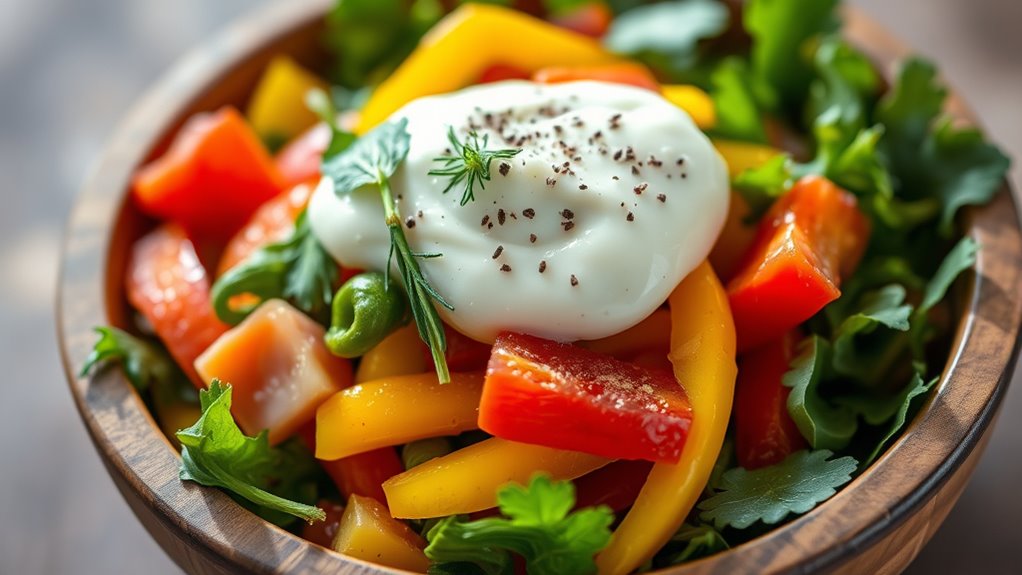You start with crisp romaine and a bright mix of tomatoes, cucumbers, and peppers, then toss them in a smooth, tangy mayonnaise blend for a creamy bite that still stays fresh. Wash and chop evenly, keep colors vivid, and whisk mayo with lemon or vinegar to keep it light. Blanch firmer veggies briefly, shock, and fold in for texture. Finish with a gentle vinaigrette or mayo, and you’ll uncover more flavor tricks if you keep reading.
Ingredients and Quantity
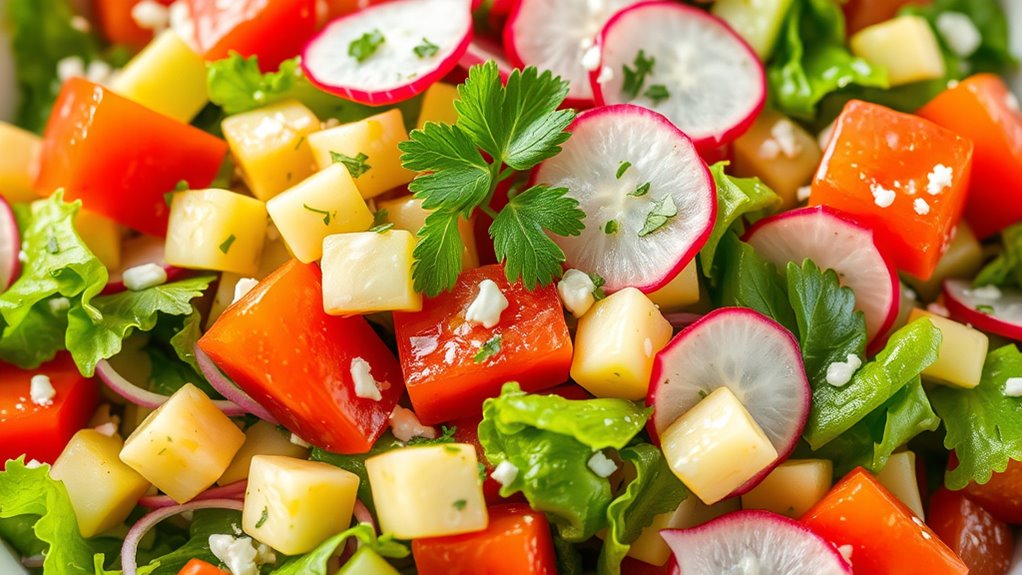
For the Vegetable Salad, gather a handful of fresh, crisp vegetables: crunchy romaine or mixed greens, ripe tomatoes, cucumbers, bell peppers, and shredded carrots. You’ll set the stage for flexible freshness, inviting fresh vegetables to play with texture and brightness, while flavor variations begin in the cutting and pairing. You choose your own rhythm, from tangy to sweet, as greens cradle the components. Salt, pepper, and a light dressing let each bite define its own character. Flavor variations emerge through herb accents and citrus zest, keeping you free to improvise. Table core:
| Item | Quantity |
|---|---|
| Romaine greens | 2 cups |
| Tomatoes | 1 cup diced |
| Cucumbers | 1 cup sliced |
| Bell peppers | 1 cup sliced |
Preparations
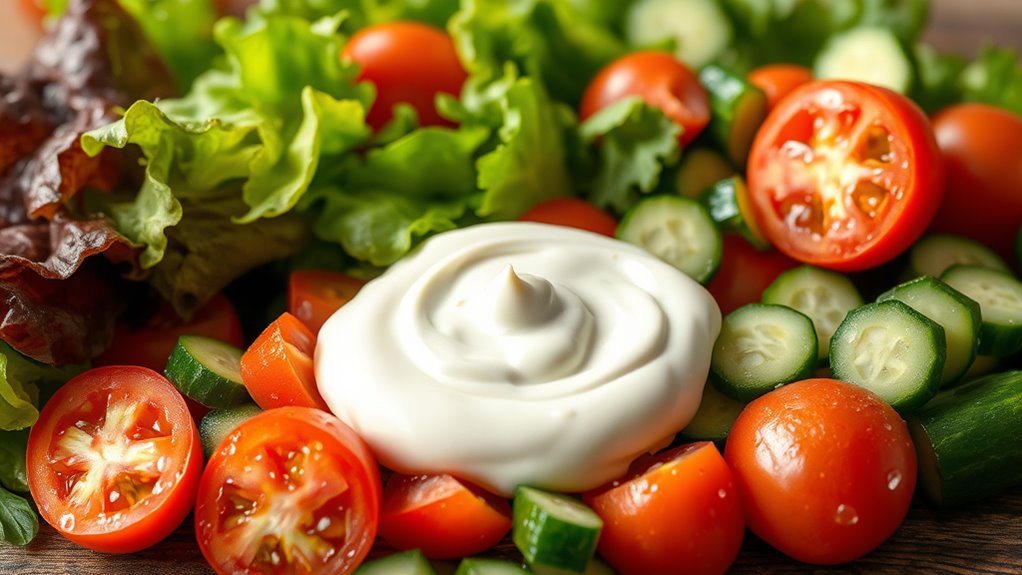
To prep your Vegetable Salad, start by washing all produce thoroughly and patting it dry to prevent soggy greens. Now you immerse yourself in the heart of salad preparation, choosing crisp textures and vibrant colors that balance flavor and mouthfeel. You’ll trim, dice, or shred with intent, keeping pieces uniform for even dressing. Prioritize ingredient selection that offers contrast—sweet, tangy, earthy, and savory notes—so every bite feels dynamic. Don’t overcomplicate: invigoratingly simple parallels elevate taste. Consider how greens, roots, and vegs interact with mayonnaise without overpowering them. Remove seeds or tough cores as needed, and taste as you go, adjusting salt and acidity to suit your mood. Your freedom shines in precise, thoughtful preparation.
Kitchen tools or Kitchenware Required
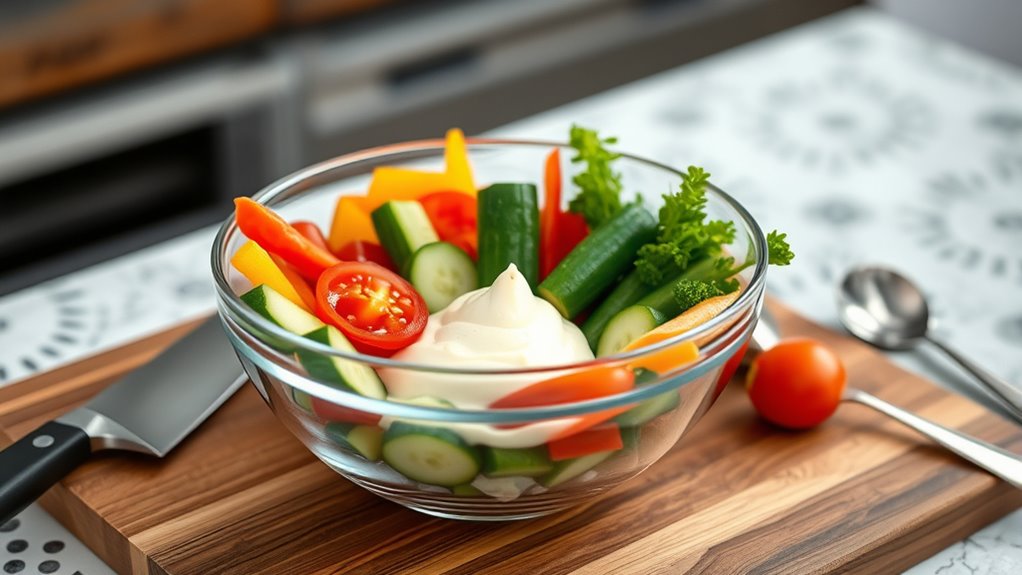
A practical set of kitchen tools makes Vegetable Salad prep smooth and satisfying. You’ll grab a sturdy salad bowl and a reliable mixing spoon, letting flavors mingle without fuss. Aim for tools that feel balanced in your hand, not disposable clutter. A sharp knife and a cutting board set keep vegetables cleanly sliced, while a grater adds zest when needed. Think simple, effective, and reusable.
| Tool | Purpose | Benefit |
|---|---|---|
| salad bowl | mixing vegetables | holds everything with ease |
| mixing spoon | toss and coat | even mayonnaise distribution |
| sharp knife | chop vegetables | precise, clean cuts |
| cutting board | prep surface | stable, safe work area |
| grater (optional) | zest and texture | brightens every bite |
How to Cook
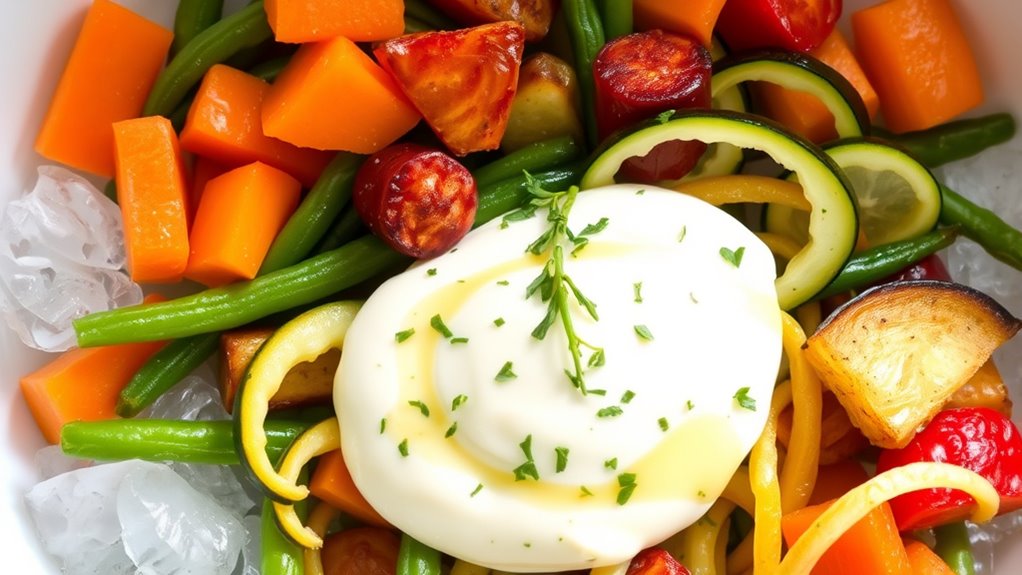
- Prepare all necessary tools and ingredients before starting.
- Focus on timing, temperature, and balance to achieve the perfect texture and flavor.
- Blanch firmer vegetables briefly to soften slightly while preserving crunch.
- Immediately shock blanched vegetables in ice water to lock in color and texture.
- Sauté softer vegetables just until they develop a slight glow, enhancing their natural sugars.
- Season vegetables boldly but subtly to enhance flavor without overpowering.
- Use mayonnaise as a base to carry the final harmony of flavors.
- Choose cooking techniques that respect each vegetable’s character, aiming for tenderness over toughness and brightness over dullness.
- Experiment with ingredient substitutions like roasted peppers for sweetness or zucchini ribbons for a lighter texture if desired.
- Finish the salad with a light vinaigrette or a mayo blend that complements without overwhelming the vegetables.
- Serve a salad that is savory, precise, and vibrant, reflecting your personal taste.
How to Serve
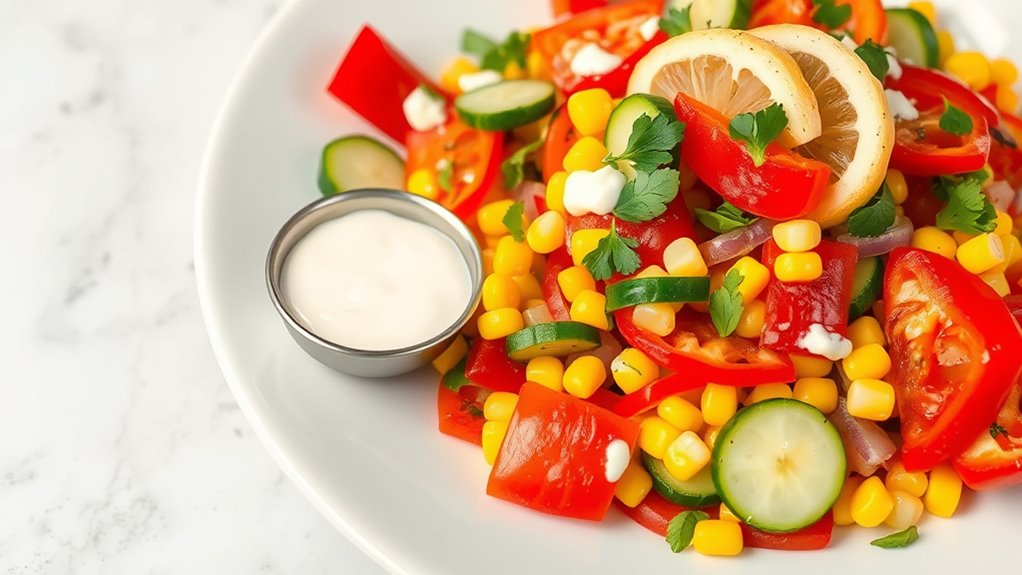
Freshness at the table starts with the way you plate and present your vegetable salad. You’ll elevate every bite by choosing a simple, clean arrangement that invites discovery. Serve with confidence, and let your plating techniques shine through contrast, color, and texture. Think about balance: light mayo gloss, crisp vegetables, and a touch of brightness from herbs or peppers. Your serving suggestions should guide guests toward portions that feel generous yet refined, without crowding the plate. Keep edges tidy, integrity intact, and aromas forward. Use serving spoons that match the dish’s scale, and present alongside a small bowl of extra mayo for personalization. Your plating matters as much as the flavors you crafted.
Fresh, crisp vegetables glow with a light mayo gloss and vivid herb accents, plated in clean, generous elegance.
- Fresh color contrast
- Clean, uncluttered edges
- Moderate mayo sheen
- Herb garnish accents
- Optional lemon twist
Tips
Here are practical tips to elevate your vegetable salad: choose crisp, seasonal veggies for texture and color, and slice evenly so every bite feels balanced. You’ll maximize flavor by tasting as you go and adjusting salt in small increments. Keep mayo light by whisking it with a splash of lemon or vinegar for brightness, then fold gently to preserve crunch. Think texture layering: add chickpeas, crunchy cucumbers, or toasted seeds for contrast. For dressing alternatives, mix yogurt with herbs for creaminess without heaviness, or use olive oil and citrus for a clean finish. Explore salad variations by rotating greens and roots to suit mood and occasion. Stay decisive: crisp, vibrant, and well-seasoned, so every forkful whispers freedom.
Food Value and Benefit
Vegetable salad is a nutrient-packed dish that combines fresh, vibrant vegetables with wholesome fats to deliver a range of health benefits. This refreshing and flavorful salad provides essential vitamins, minerals, and fiber that support overall well-being while keeping you energized and satisfied.
Vegetable salad blends fresh produce with wholesome fats for energizing, nutrient-rich goodness.
Benefits of eating this vegetable salad include:
- Rich source of vitamins A, C, and K, which promote healthy vision, immune function, and blood clotting
- Contains minerals such as potassium and magnesium that support heart health and muscle function
- High fiber content aids digestion and helps maintain a healthy gut
- Wholesome fats from ingredients like mayo or avocado help absorb fat-soluble vitamins and support brain health
- Hydrating vegetables contribute to proper hydration and skin health
- Balanced portions sustain energy levels without causing heaviness or sluggishness
- Customizable with herbs, spices, and lemon to enhance flavor and antioxidant intake
Enjoying this vegetable salad is a practical way to nourish your body with essential nutrients while delighting your taste buds.
Frequently Asked Questions
Can I Substitute Vegan Mayo in This Recipe?
Yes, you can substitute vegan mayo. You’ll notice flavor differences, so adjust salt and lemon to taste; the texture may shift slightly, yet the dish remains satisfying, flexible, and true to your craving for lighter, freer, plant-based flavor.
How Long Does the Salad Stay Fresh?
The salad stays fresh for about 3–4 days in the fridge. For best shelf life, store in an airtight container and keep mayo-coated vegetables evenly chilled. Shelf life improves with minimal dressing; use fresh veggies, avoid overmixing.
Can I Add Cheese to the Salad?
Yes, you can. Picture a modern feast as you mix in cheese types, choosing feta, blue, or parmesan for zest; pairings matter, so balance salt and creaminess, and savor the liberated flavors in your vibrant salad.
Is This Salad Suitable for Freezing?
No, you shouldn’t freeze this salad; the mayo-bound texture will split. For best results, freeze separate components only. When thawed, notice salad texture changes, so use as a fresh side. Freezing tips: avoid dressing until serving.
What Are Alternative Dressings Besides Mayo?
Yes, try alternative dressings like vinaigrette, lemon-herb, yogurt-dill, or balsamic glaze. You’ll love creamy options, too—blend avocado or tahini with herbs for silky textures. Embrace freedom in flavor, and tailor dressings to your taste.
References
- https://en.wikipedia.org/wiki/Salad
- https://www.foodsafety.gov/food-safety-charts/cookingtips.html
- https://www.ncbi.nlm.nih.gov/pmc/articles/PMC6466860/
- https://www.epicurious.com/recipes/food/views/vegetable-salad-51267900
- https://www.cdc.gov/nutrition/food-safety.html
- https://www.health.harvard.edu/staying-healthy/the-health-benefits-of-eating-salad
- https://www.webmd.com/diet/health-benefits-salads
- https://www.vegetablegardener.com/print/article/how-to-make-a-simple-salad
- https://www.americanheart.org/en/healthy-living/healthy-eating/eat-smart/nutrition-basics/salads-and-dressings
- https://www.nutrition.gov/topics/food-safety/food-safety-tips-salads
